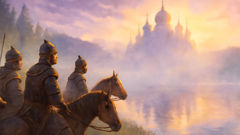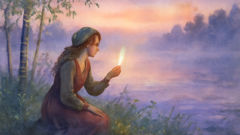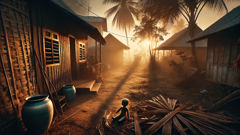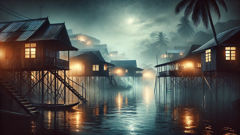Introduction
In the vast, green heart of Russia, where birch forests whisper ancient secrets and wild swans glide over mirror-like waters, there lies a lake unlike any other. Lake Svetloyar, still and enigmatic, is shrouded in a misty silence broken only by the gentle songs of birds at dawn. Local villagers say that on rare nights, when the moon is full and the world is hushed, one can hear the distant tolling of bells and catch a shimmer of golden domes beneath the water’s surface. For centuries, this haunting melody and hidden gleam have been attributed to Kitezh—a city wrapped in legend, beauty, and mystery. According to the old tales, Kitezh was once a city of splendor and wisdom, its people living in harmony, guided by kindness and faith. When the Mongol horde swept through Rus’, leaving ruin in its wake, Kitezh stood as a beacon of hope. Yet as the threat grew nearer, the city’s fate became entwined with the courage and purity of its inhabitants. Rather than surrender to violence, Kitezh was said to vanish from sight, sinking beneath the waters to protect its innocence from destruction. It is believed that only those with hearts untainted by greed or malice can find Kitezh; to others, it remains invisible, lost to the world. This is the story of Kitezh—of its last days above water, of the trials faced by its people, and of the legend’s enduring promise: that wisdom, faith, and purity can protect what is most precious, even when darkness closes in. As the mists roll over Lake Svetloyar and the birches stand tall along its shores, the legend lives on, inviting dreamers and seekers to look beyond the surface, and to believe that miracles are possible for those who seek with pure intent.
The City of Harmony and the First Omen
In the time before calamity, Kitezh was a marvel—its white stone walls rose above flower-strewn meadows, and its gilded churches caught the sunlight at dawn. The people here lived simply but joyfully, tending to their gardens, gathering in the cathedral square for festivals, and helping their neighbors with open hands and honest smiles. The city’s ruler, Prince Yuri, was beloved for his gentle wisdom. His daughter, Princess Fevroniya, was known not just for her beauty but for her compassion—she tended the sick, taught orphaned children to read, and walked barefoot among her people so as never to place herself above them.

Life in Kitezh was peaceful, but it was not untouched by the larger world. Stories of war and pillaging drifted from faraway towns, carried by merchants and wandering monks. Yet the city, protected by dense forests and the vast, glimmering lake, seemed insulated from violence. It was said that God himself watched over Kitezh, granting it a peace denied to many other places.
One spring morning, as the city prepared for the festival of renewal, a strange event unsettled the townsfolk. At the edge of the lake, a fisherman named Ivan pulled in his nets to find them empty, save for a single white swan, injured but alive. The swan’s wing was bloodied, but its eyes were serene, as if it understood more than human words could express. Ivan carried the swan to Princess Fevroniya, who cradled it in her arms and whispered gentle words. That night, as she nursed the bird by candlelight, she dreamed of the city under water and heard bells ringing from below.
The next morning, a low mist clung to the lake, refusing to lift even as the sun climbed high. The city’s elders gathered in concern. The high priest spoke of omens: “Water is life and water is loss. We must prepare our souls for trial, for the world’s storm draws near.”
Rumors of the Mongol horde grew more urgent. Traders who arrived breathless and pale told of cities burning and people fleeing. Prince Yuri summoned his council, but the people refused to abandon their home. “We will not give up Kitezh,” they declared. “This is our sanctuary.”
That night, as fear took root, Princess Fevroniya walked alone to the edge of Lake Svetloyar, the healed swan resting on her shoulder. She prayed for guidance. In the silence, she heard the swan speak—not in words, but in a music that filled her heart with courage. “When the shadow falls, hold fast to kindness,” the melody seemed to say. “Only the pure of heart will know the way.”
As the days passed, the city’s spirit did not falter. Fevroniya led her people in helping refugees who arrived at Kitezh’s gates. She opened the palace kitchens to the hungry and gave her own cloak to a shivering child. The city became a haven not only for its citizens but for all who needed shelter. Yet the signs of coming doom increased: the birds sang less, the wildflowers closed early, and the river’s song turned mournful.
Then, one evening as the sun set in a blaze of crimson, a rider galloped into Kitezh, wounded and exhausted. He brought news that the Mongols were only days away. Prince Yuri faced his people in the square. “I have taught you peace, not war. I cannot command you to fight, but I beg you—do not forsake hope.”
The people gathered on the lakeshore that night, led by Fevroniya. Together they sang hymns, their voices rising above the mist. As midnight fell, the healed swan took flight across the water, its wings shining like silver. Some claimed they saw a great light descend upon the city. Others said the bells of Kitezh rang with a sound so pure it brought tears even to the hardest hearts. In that moment, something changed—the first veil between Kitezh and the world began to form, a shimmering boundary that separated wisdom and innocence from violence and despair.
The Siege of Kitezh and the Miracle of the Lake
As summer deepened, Kitezh braced itself for the storm. Every dawn, Fevroniya and her father led prayers in the cathedral, seeking strength for what lay ahead. The people stored food, built simple defenses, and tended to the wounded who arrived from ravaged towns. Yet a strange peace lingered over the city—a sense that Kitezh’s greatest defense was not walls or weapons, but the unity and compassion of its people.

The Mongols came at dusk, their banners darkening the horizon. Their leader, Batu Khan, was said to be ruthless, his warriors hardened by endless conquest. As they surrounded the city, a hush fell over Kitezh. Instead of panic, a profound stillness reigned. The people gathered in the square, singing hymns that echoed across the lake. Some wept, others clasped hands, but all stood together. Fevroniya, radiant in a simple white gown, held the hand of a frightened boy named Yaroslav—a refugee whose parents had perished in a distant village. She promised him, “No matter what happens, you are not alone.”
The Mongols demanded surrender. Prince Yuri, standing atop the city walls, refused: “Kitezh will not bow to violence. Our power lies not in arms, but in our hearts.” The Khan, enraged, ordered the attack at dawn.
That night, as terror crept through the city, Fevroniya knelt in prayer at the cathedral’s altar. With her, Yaroslav prayed for his parents and for all those he had lost. A hush fell over the sanctuary. Suddenly, a light suffused the room—not from candles, but from somewhere deeper and more ancient. The cathedral bells began to ring on their own, their peal strange and beautiful. Outside, a mist thicker than any before began to roll in from the lake, swallowing streets, gardens, and even the Mongol tents.
At sunrise, the Mongols charged. But as they entered Kitezh, the city seemed to dissolve before their eyes. The streets faded into mist, the walls became insubstantial, and the golden domes flickered like distant stars. The invaders stumbled through empty courtyards and silent squares, finding nothing but water and reeds. Some claimed they saw shadowy figures singing beneath the lake. Others fell to their knees, overcome by fear or awe.
The people of Kitezh—Fevroniya, Prince Yuri, Yaroslav, and all those who stood with them—were gone. The city had vanished, hidden beneath the waters of Lake Svetloyar. The Mongols searched in vain. They raged and cursed and tried to drain the lake, but nothing could pierce the veil that now shrouded Kitezh. In time, even Batu Khan felt a strange calm descend. He gazed into the water and glimpsed, for a moment, his own reflection—older, weary, and changed.
For days after, fishermen on Lake Svetloyar reported strange sights: domes glimmering just below the surface, faint lights moving in the deep, and music rising from unseen choirs. The story spread: Kitezh had not been destroyed but had become invisible to all but the pure of heart. Some said the city had ascended to heaven; others believed it awaited the day when wisdom and kindness would return to the world.
Yaroslav, though small and afraid, had clung to hope. In the hidden city below the lake, he found a new family among the citizens of Kitezh. He grew in courage and wisdom under Fevroniya’s gentle guidance. The swan often visited him in dreams, whispering that the world above still needed stories of hope.
The Mongols eventually departed, leaving Lake Svetloyar in peace. The forests grew thick once more along the shore. Travelers who came seeking treasure or glory found only stillness and silence. But those who came in humility—bearing sorrow, seeking solace—sometimes heard the bells or glimpsed the golden domes through a veil of mist. And so, Kitezh lived on, not just as a city beneath the water, but as a promise: that wisdom, faith, and purity would outlast any darkness.
The Pilgrim’s Quest and the Echo of Wisdom
Years passed, and Kitezh became legend. Pilgrims journeyed from distant lands to Lake Svetloyar, drawn by stories of miracles and longing for a glimpse of the hidden city. Some came out of curiosity, others in search of healing or forgiveness. Most left disappointed, seeing only reeds and water. Yet a few—those who carried burdens of sorrow or hearts full of hope—claimed to hear music or see glimmers beneath the surface.

Among these seekers was a young woman named Anya. Orphaned by war, she wandered the forests alone until she reached the lake’s edge. Anya carried no riches and wore only a simple dress patched at the elbows. Her greatest treasure was a single silver icon—a gift from her mother, lost to time. She fell to her knees beside the water and wept for all she had lost. As dawn broke and birds began their morning songs, she heard a distant bell tolling below the surface.
Moved by wonder, Anya resolved to discover the secret of Kitezh. She asked local villagers, who spoke of Princess Fevroniya’s kindness and of Yaroslav’s courage. Anya spent weeks by the lake, helping elderly fishermen mend their nets and singing lullabies to orphaned children. Her gentle spirit earned her respect among the villagers, and in her heart she felt a growing peace.
One misty evening, as twilight settled over Lake Svetloyar, Anya saw something extraordinary. The water shimmered, and a path of silver light appeared. She followed it to a small island where birches grew tall and wildflowers bloomed. There, standing beneath the trees, was Princess Fevroniya—radiant as legend described, holding a white swan in her arms. “Why do you seek Kitezh?” Fevroniya asked softly.
Anya replied, “I seek a place where sorrow is healed and kindness is not forgotten.” Fevroniya smiled. “You have found it—not in a city of stone or gold, but in your heart.” As she spoke, the swan took flight, scattering drops of silver into the air. The island vanished, and Anya awoke on the lakeshore, tears drying on her cheeks. In her palm she found a single white feather, soft as hope.
Anya spent her days helping others and her nights dreaming of Kitezh. She never again saw Fevroniya, but whenever she felt lost or afraid, she pressed the white feather to her heart and remembered the lesson she had learned: that wisdom and kindness are the keys to every hidden city.
The legend of Kitezh grew with each generation. Some said that when Russia’s need was greatest—when darkness threatened to overwhelm hope—the city would rise again from the lake, led by Fevroniya and those who held wisdom in their hearts. Until then, Kitezh remained invisible but ever-present—a symbol not just of escape, but of spiritual triumph.
Conclusion
To this day, the legend of Kitezh lingers in the quiet beauty of Lake Svetloyar. Pilgrims still travel there, hoping for a glimpse of golden domes or the sound of distant bells. Locals say that on certain nights, when the mist is thickest and the world is still, music rises from below—reminding all who listen that wisdom and kindness endure beyond time. Kitezh’s story is more than a tale of a city lost; it is a living promise that what is pure cannot be destroyed, only hidden until it is needed once more. For every seeker who approaches the lake with a true heart, there remains a chance—however fleeting—to find their own path to Kitezh, where hope and wisdom forever shine beneath the waters.













